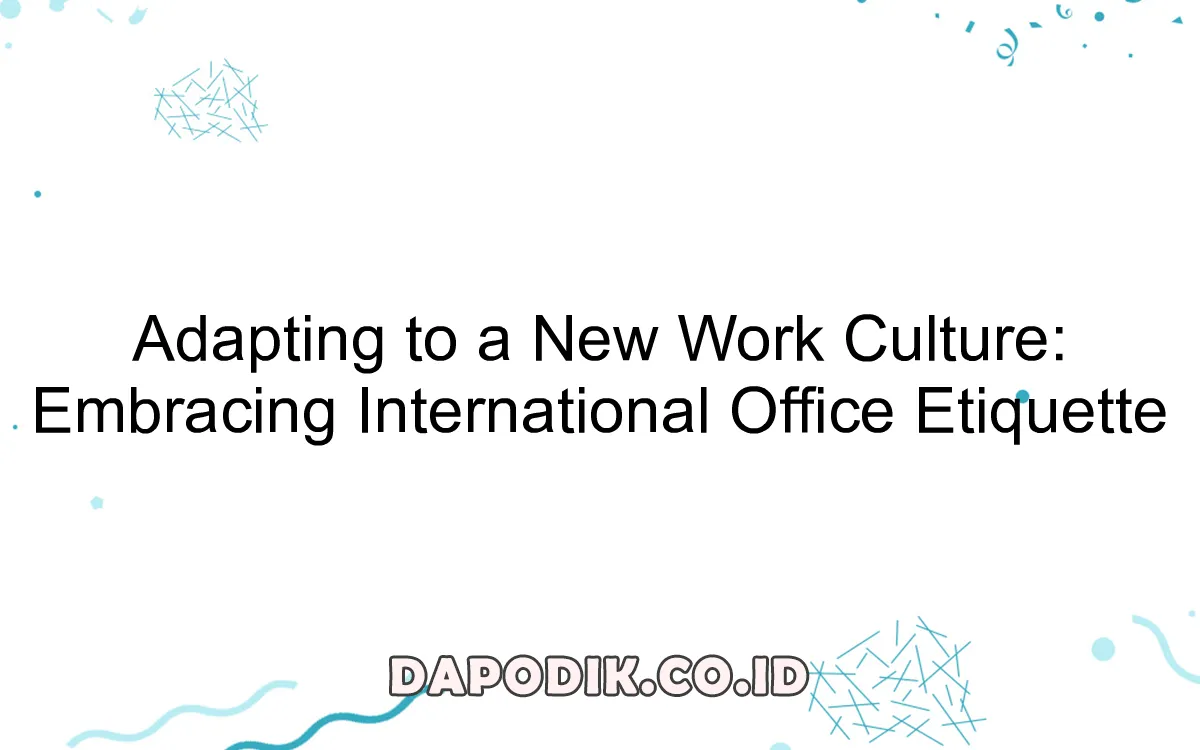Adapting to a New Work Culture: Embracing International Office Etiquette
Adapting to a new work culture is essential for thriving in today’s globalized economy. In the article “Embracing International Office Etiquette,” we will explore the significance of understanding and implementing diverse office customs. From communication styles to business etiquette, this article will guide you through the essentials of fostering successful cross-cultural collaboration.
Understanding Cultural Norms and Values
Adapting to a New Work Culture: Embracing International Office Etiquette
In today’s globalized world, many professionals find themselves working in international settings. This requires not only adapting to a new work culture but also embracing different cultural norms and values. Understanding and respecting these cultural differences is essential for fostering positive relationships and effectively collaborating with colleagues from diverse backgrounds. Here are some key points to consider when navigating international office etiquette:
1. Communication Style
Different cultures have distinct communication styles. While some may value direct and assertive communication, others prefer indirect and diplomatic approaches. Understanding these preferences can help avoid misunderstandings and ensure effective communication.
2. Time Management
Time management practices vary across cultures. Some cultures prioritize punctuality and expect meetings to start on time, while others have a more relaxed attitude towards time. Familiarize yourself with the expectations in your new work culture and adjust your habits accordingly to demonstrate respect for colleagues’ time.
3. Hierarchy and Authority
In some cultures, hierarchical structures and respect for authority are highly valued. It is important to observe and understand the hierarchical relationships within your new work environment and adapt your behavior accordingly. This may involve showing deference to senior colleagues or using the appropriate honorifics when addressing superiors.
4. Dress Code
Dress codes can vary significantly from one culture to another. While some workplaces encourage more casual attire, others maintain formal dress codes. Pay attention to how your colleagues dress and try to align your clothing choices accordingly, striking a balance between comfort and professionalism.
5. Personal Space and Gestures
Personal space and gestures can also differ across cultures. What may be considered appropriate in one culture might be seen as intrusive or offensive in another. Be aware of different cultural norms regarding personal space, greetings, and physical gestures to avoid accidentally crossing boundaries.
Adapting to a new work culture can be both exciting and challenging. By understanding and respecting cultural norms and values, you can navigate the intricacies of international office etiquette with ease. Embrace the opportunity to learn from your colleagues’ diverse perspectives and experiences, fostering a more inclusive and productive work environment.
Adapting communication styles
Adapting to a new work culture requires more than just understanding international office etiquette. It also involves embracing different communication styles to effectively interact with colleagues from diverse backgrounds. Here are some tips to help you navigate this aspect of working in a multicultural environment:
1. Active listening
One fundamental skill in adapting communication styles is active listening. Being attentive and engaged during conversations demonstrates your respect for the speaker and their perspective. Avoid interrupting and make an effort to understand their point of view before expressing your own.
2. Non-verbal cues
Non-verbal communication varies across cultures. To avoid misunderstandings, pay attention to non-verbal cues such as body language, facial expressions, and gestures. Be aware that certain gestures or behaviors might have different meanings in different cultures.
3. Clarity and simplicity
When communicating with colleagues whose first language may not be English, it is important to use clear and simple language. Avoid using jargon, idioms, or complex terminology that might confuse others. Opt for simple explanations and provide examples if necessary.
4. Written communication
In written communication, take extra care to be clear and considerate. Avoid using ambiguous phrases or slang that may be misinterpreted. Proofread your emails or any written correspondence to ensure they are free from errors and convey your intended message accurately.
5. Flexibility and adaptation
Different cultures have different communication styles and norms. Be open-minded and willing to adapt your own communication style to accommodate others. Pay attention to feedback and be receptive to suggestions for improvement.
6. Building relationships
Effective communication is crucial for building strong relationships in the workplace. Take the time to get to know your colleagues personally, as this can help create a more inclusive and supportive work environment. Be respectful of cultural differences and show genuine interest in learning about other cultures.
7. Seeking clarification
If you are uncertain about something or if there is a miscommunication, don’t hesitate to seek clarification. Asking questions and seeking feedback demonstrates your commitment to understanding and maintaining clear communication.
By adapting your communication style, you not only promote effective collaboration and understanding but also foster a harmonious and inclusive work environment. Embracing different communication styles is an essential step in successfully adjusting to a new work culture.
Conclusion
Adapting to a new work culture and embracing international office etiquette is crucial for professionals today. By understanding and respecting the norms and practices of different cultures, individuals can create a harmonious and productive work environment. This includes being mindful of communication styles, time management, and respecting diversity, ultimately leading to better collaboration and success in a globalized world.

Posting Komentar untuk "Adapting to a New Work Culture: Embracing International Office Etiquette"
Gambar ataupun video yang ada di situs ini terkadang berasal dari berbagai sumber media lain. Hak Cipta sepenuhnya dipegang oleh sumber tersebut.